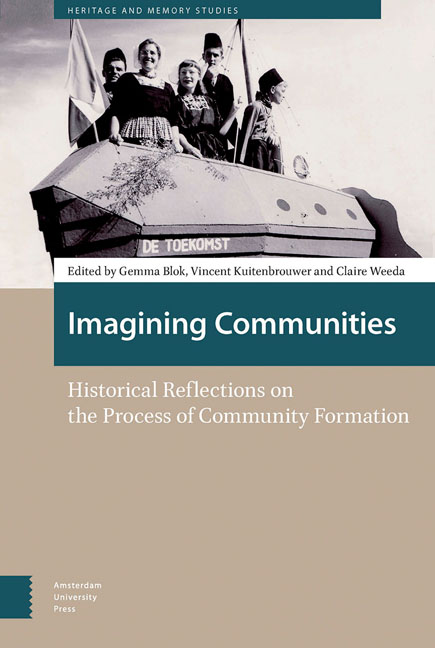Book contents
- Frontmatter
- Contents
- List of Figures
- Introduction
- 1 Meanwhile in Messianic Time: Imagining the Medieval Nation in Time and Space and English Drinking Rituals
- 2 Diverse Origins and Shared Circumstances: European Settler Identity Formation in the Seventeenth-Century Plantation Colony of Suriname
- 3 Imagining Europe: The Peace of Ryswick (1697) and the Rise of European Consciousness
- 4 Gypsy Music and the Fashioning of the National Community
- 5 ‘Tired, Worried and Overworked’: An International Imagined Community of Nervous Sufferers in Medical Advertisements, 1900-1920
- 6 ‘From Heart to Heart’: Colonial Radio and the Dutch Imagined Community in the 1920s
- 7 Indonesian Nationalism in the Netherlands, 1920s-1930s: Long-Distance Internationalism of Elite Pilgrims in Homogeneous, Empty Time
- 8 Time, Rhythm and Ritual: Imagined Communities in L’espoir (1937) and Les sept couleurs (1939)
- 9 Stamverwantschap and the Imagination of a White, Transnational Community: The 1952 Celebrations of the Jan van Riebeeck Tercentenary in the Netherlands and South Africa
- 10 ‘L’Oranie Cycliste, une grande famille’: Recycling Identities and the Pieds-Noirs Communitas, 1976-2016
- 11 Remembering and Imagining the National Past: Public Service Television Drama and the Construction of a Flemish Nation, 1953-1989
- Index
7 - Indonesian Nationalism in the Netherlands, 1920s-1930s: Long-Distance Internationalism of Elite Pilgrims in Homogeneous, Empty Time
Published online by Cambridge University Press: 11 December 2020
- Frontmatter
- Contents
- List of Figures
- Introduction
- 1 Meanwhile in Messianic Time: Imagining the Medieval Nation in Time and Space and English Drinking Rituals
- 2 Diverse Origins and Shared Circumstances: European Settler Identity Formation in the Seventeenth-Century Plantation Colony of Suriname
- 3 Imagining Europe: The Peace of Ryswick (1697) and the Rise of European Consciousness
- 4 Gypsy Music and the Fashioning of the National Community
- 5 ‘Tired, Worried and Overworked’: An International Imagined Community of Nervous Sufferers in Medical Advertisements, 1900-1920
- 6 ‘From Heart to Heart’: Colonial Radio and the Dutch Imagined Community in the 1920s
- 7 Indonesian Nationalism in the Netherlands, 1920s-1930s: Long-Distance Internationalism of Elite Pilgrims in Homogeneous, Empty Time
- 8 Time, Rhythm and Ritual: Imagined Communities in L’espoir (1937) and Les sept couleurs (1939)
- 9 Stamverwantschap and the Imagination of a White, Transnational Community: The 1952 Celebrations of the Jan van Riebeeck Tercentenary in the Netherlands and South Africa
- 10 ‘L’Oranie Cycliste, une grande famille’: Recycling Identities and the Pieds-Noirs Communitas, 1976-2016
- 11 Remembering and Imagining the National Past: Public Service Television Drama and the Construction of a Flemish Nation, 1953-1989
- Index
Summary
Abstract
This chapter analyses the position of the Perhimpoenan Indonesia, an Indonesian students’ association in the Netherlands in the interwar era which has been widely recognized as a trailblazing organization within the Indonesian political landscape, in relation to concepts from the work of Benedict Anderson. There has been an evolution in the thinking of Anderson, in which he replaced the strictly comparative framework of Imagined Communities with a global conception of nationalism in Under Three Flags, in which travelling ideas and intellectuals were of central importance. In this sense, expatriate communities such as the Indonesian students in the Perhimpoenan Indonesia were repositioned from being eccentric to the Indonesian political landscape to being in the centre of the international stage.
Keywords: Perhimpoenan Indonesia, Indonesian nationalism, student associations, long-distance nationalism, imagined community, homogeneous, empty time
In February 1922, the Indonesian students’ association in the Netherlands changed its name from Indische Vereeniging (Indies’ Association) to Indonesische Vereeniging (Indonesian Association, later translated in Perhimpoenan Indonesia). Two years later, it also renamed its journal Hindia Poetra (Sons of the Indies), which was now called Indonesia Merdeka (Indonesia Free). The new names signalized the advent of a new national imagined community among Indonesians in the Netherlands, and symbolized the political transformation of the organization into the advanced post of the Indonesian national movement in Europe. This chapter will reposition the Indonesian Association in the Netherlands – which has been widely recognized as a trailblazing organization within the Indonesian political landscape – in its European and international context. It will also show how concepts in the work of the late Benedict Anderson, such as imagined communities, long-distance nationalism and homogeneous, empty time, have contributed to our understanding of the political value of expatriate organizations and communities such as the Indonesian Association in the Netherlands.
The first Indonesian students arrived in the Netherlands around the turn of the twentieth century. These young elites had come to the Netherlands for an academic education in disciplines such as medicine, law and economics, and lived in university towns such as Leiden, Utrecht and Amsterdam. The community grew from a few dozen people in the first two decades of the twentieth century, to up to around 175 people in the peak years before the Great Depression.
- Type
- Chapter
- Information
- Imagining CommunitiesHistorical Reflections on the Process of Community Formation, pp. 131 - 148Publisher: Amsterdam University PressPrint publication year: 2018



